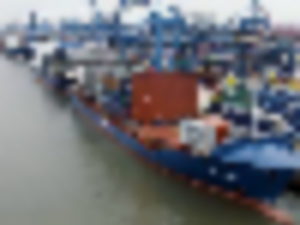Iran’s arrest of a South Korean tanker is “complicated”
On 4 January Iran detained the South Korean chemical tanker Hankuk Chemi for allegedly ‘repeatedly’ violating its environmental regulations and polluting its waters.
Rotterdam Shortsea Terminals expect Brexit to drive more trans-channel freight onto container ships in 2021
Cees van Pelt, manager technical operations, Rotterdam Shortsea Terminals (RST) warned that post-Brexit maritime commerce between the UK and Europe is likely to face congestion and delays during the first half of 2021 resulting, at least temporarily, in more Trans-Channel freight being transported by container ships as opposed to rail and Ro/Ro (Roll On/Roll Off ships).
AWO’s Carpenter cites Jones Act and WRDA gains in 2020 despite Covid challenges
Jennifer Carpenter, president of the American Waterways Operators (AWO) told AJOT in an interview that despite the Covid crisis, the industry benefited from a number of successes in the outgoing 116th Congress:
AGTC Hears U.S. Import Surge Could Last Through 2021
Paul Bingham, an economist for IHS Markit, told the Agriculture Transportation Coalition ( AgTC) members that the surge of imports into the United States from Asia in the second half of 2020 is likely to continue through 2021. The import surge has caused congestion at the Ports of Los Angeles and Long Beach and is complicating the efforts of agricultural exports to obtain equipment and vessel bookings for sails to Asia.
HTA’s LaBar assails ocean carrier charges and supply chain dislocations
Weston LaBar, president of the Harbor Trucking Association (HTA), based in Long Beach, California, said that recent ocean carrier practices have led to congestion and application of unfair charges for detention and demurrage on truckers and shippers that “will result in the loss of cargo” at the ports of Los Angeles and Long Beach.
Texas proposes $26 billion coastal defense network
The Texas Legislature will be asked to approve a $26 billion coastal defense network, including $12 billion for storm surge gates to protect Galveston Bay and the Port of Houston from hurricanes and storm surges, according to Tony Williams, environmental review coordinator for the Texas General Land Office.
AGTC’s Friedmann lauds FMC investigation into detention & demurrage
Peter Friedmann, executive director, Agriculture Transportation Coalition (AGTC) praised the decision of the Federal Maritime Commission (FMC) on November 18th to open an investigation into detention and demurrage and related issues that have exacerbated problems for U.S. agricultural since the Covid-19 outbreak began earlier this year.
Flexibility and Culture Tested in the “New Normal”
Adopting flexibility as a mechanism for reinvention and adaptation as supply chains and the workforce becomes more complicated is a mandate in a post-pandemic era. How can the logistics industry preserve thriving business cultures and also make dramatic changes to work processes? Systems are only as flexible as the people who create them. We propose investing in your existing employees as a key strategy for perpetuating a positive culture, ensuring productivity, and cultivating leaders organically.
Special panel discusses steel logistics at world’s largest steel conference
Thanks to Covid-19, the hordes of steel executives who descend on New York in June each year from around the world to participate in the Steel Success Strategies (SSS) conference, made a virtual appearance this year instead of “in flesh and blood”. The SSS-2020, which was scheduled to take place in June, was held Oct.26-28 this year in the virtual theater.
Waves of change: Assessing the potential impact of a carbon levy on shipping costs
Authors James Morgan and James “Jay” Campbell of Opportune LLP examine how a proposed carbon levy is the latest in a wave of change potentially facing the global shipping industry.
© Copyright 1999–2024 American Journal of Transportation. All Rights Reserved











